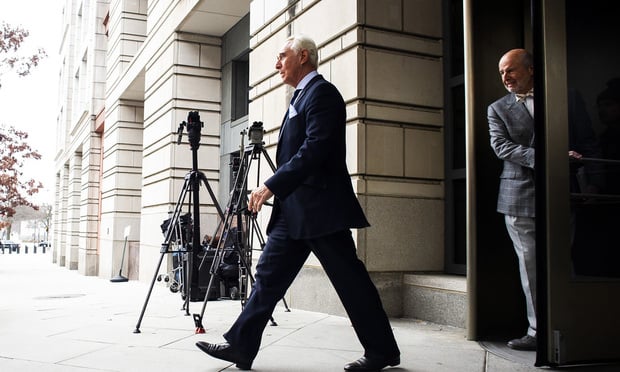DOJ Tells Judge: COVID-19, Not Politics, Is Behind Stalling Roger Stone's Prison Time
The filing comes on the heels of testimony from a former Stone prosecutor who said there was political pressure to give the Trump ally "a break" on his recommended sentence.
June 26, 2020 at 12:32 AM
6 minute read
 Former Trump adviser Roger Stone departs federal court after attending his arraignment in Washington, D.C., on Jan. 29, 2019. (Photo: Diego M. Radzinschi/ALM)
Former Trump adviser Roger Stone departs federal court after attending his arraignment in Washington, D.C., on Jan. 29, 2019. (Photo: Diego M. Radzinschi/ALM)
Justice Department lawyers late Thursday told a federal judge they aren't opposing Roger Stone's request to delay his report date to federal prison due to a department-wide policy on the COVID-19 pandemic and not for any other reasons, one day after a former prosecutor on the case alleged DOJ leadership sought special treatment for the longtime Trump associate.
Stone earlier this week filed the motion to delay his report date to a federal correctional facility from June 30 until Sept. 3, and his attorneys wrote in the filing that government lawyers did not oppose the request.
In the filing, prosecutors with the U.S. Attorney's Office for the District of Columbia wrote that the office has received guidance from DOJ and the Executive Office of United States Attorneys to "not object to a defendant's request to extend a voluntary surrender date for up to 60 days, even at this stage of the pandemic, unless the defendant poses an immediate public safety or flight risk. The directive applies to defendants whether they pled guilty or were found guilty after a trial, and without respect to age, health, or other COVID-19 risk factors."
"For that reason—and that reason only—the U.S. Attorney's Office for the District of Columbia does not oppose defendant Roger J. Stone's request to extend his voluntary surrender date for up to 60 days," the filing reads.
U.S. District Judge Amy Berman Jackson appeared reluctant to immediately grant Stone's request to delay the report date to a federal correctional facility, issuing orders that appeared aimed at ensuring Stone wasn't receiving special treatment.
The filings played out in the backdrop of former Special Counsel Robert Mueller prosecutor Aaron Zelinsky's congressional testimony that he was pressured to give Stone "a break" in a sentencing memo due to Stone's ties to the president. All four line prosecutors resigned from the case after Main Justice intervened to submit a second sentencing recommendation, which asked solely that Stone be incarcerated.
In the hours and days after Stone filed the request, which stated that Justice Department attorneys didn't oppose pushing off the report date, Jackson issued multiple requests for additional information. She ordered DOJ to file a brief explaining why it didn't oppose Stone's motion to extend his surrender date, and followed that up with a later order instructing government attorneys to explain any existing policies on similar requests in light of COVID-19 and how they have "responded to similar motions in other cases."
On Thursday, the judge also asked Stone and his attorneys to tell the court if the Bureau of Prisons had previously agreed to postpone his surrender date and to provide her with any records of that correspondence.
In Thursday's court filing, signed by acting U.S. Attorney for D.C. Michael Sherwin and prosecutors J.P. Cooney and John Crabb, the government lawyers pointed to Jackson denying prosecutors' request that Stone be taken into custody after the jury returned his guilty verdict as reason he did not pose a flight or other risk, despite being convicted of making threats toward the dog of Randy Credico, who testified at Stone's trial, and posting an image of the judge with a crosshairs in the corner.
The brief also said that the Bureau of Prison set the June 30 report date in mid-April, which "was selected at least in part based on concerns over the defendant's health, which were communicated to BOP by his attorney."
"At no point since that original designation has the U.S. Attorney's Office had any role in or attempted to exert any influence over whether BOP should revise the June 30 surrender date," the filing reads.
Cooney, one of the signatories on the filing, was named by Zelinsky at this week's congressional hearing as one of the supervisors at the U.S. attorney's office who spoke about concerns that prosecutors were facing political pressure to recommend a lighter sentence for Stone than that set by the sentencing guidelines.
The filing also says that, as of Wednesday, there are no confirmed COVID-19 cases among the staff or incarcerated at the correctional facility where Stone is set to report.
The Bureau of Prisons has ordered Stone to report to a federal correctional facility on June 30 to serve his 40 month sentence. Stone has called that order a "death sentence," citing the COVID-19 pandemic and his own medical conditions. He has filed at least one medical document with the court under seal.
Trump has floated the prospect of a presidential pardon multiple times, but has not yet fully committed to issuing one for his longtime ally.
Stone also switched up his legal team as he appeals both his conviction and Jackson's order denying his request for a new trial, after he alleged the foreperson on his jury was biased against him and lied on her juror questionnaire about anti-Trump social media posts she made before and during the course of the November 2019 trial.
Stone hired New York lawyer Seth Ginsberg as he pushed for a new trial, and more recently brought on board attorneys Paul Kamenar and David Schoen as the case goes to the U.S. Court of Appeals for the D.C. Circuit.
Jackson earlier this year rejected the effort for a new trial, calling Stone's motion a "tower of indignation" and ruling a juror's posts against Trump did not mean she was biased against Stone.
Stone was the last figure to be indicted by Mueller, for lying to the House Intelligence Committee about his purported contacts with WikiLeaks ahead of the 2016 election and witness tampering. A Washington, D.C., jury in November found him guilty on all counts.
Read more:
Divided DC Circuit Orders Flynn Judge to Dismiss Prosecution at Trump DOJ's Request
Jonathan Kravis, Prosecutor Who Opposed Barr in Stone Case, Joins Munger Tolles
'Berman Will Be Fine': Some Think Spat Might Help Ex-US Attorney's Career Prospects
This content has been archived. It is available through our partners, LexisNexis® and Bloomberg Law.
To view this content, please continue to their sites.
Not a Lexis Subscriber?
Subscribe Now
Not a Bloomberg Law Subscriber?
Subscribe Now
NOT FOR REPRINT
© 2025 ALM Global, LLC, All Rights Reserved. Request academic re-use from www.copyright.com. All other uses, submit a request to [email protected]. For more information visit Asset & Logo Licensing.
You Might Like
View All

In-House Moves of the Month: Boeing Loses Another Lawyer, HubSpot Legal Chief Out After 2 Years
5 minute read
After Regime Change, Syria Remains Liable in US Federal Courts for Alleged Assad-Era Terrorism Support
3 minute read
Trending Stories
- 1Uber Files RICO Suit Against Plaintiff-Side Firms Alleging Fraudulent Injury Claims
- 2The Law Firm Disrupted: Scrutinizing the Elephant More Than the Mouse
- 3Inherent Diminished Value Damages Unavailable to 3rd-Party Claimants, Court Says
- 4Pa. Defense Firm Sued by Client Over Ex-Eagles Player's $43.5M Med Mal Win
- 5Losses Mount at Morris Manning, but Departing Ex-Chair Stays Bullish About His Old Firm's Future
Who Got The Work
J. Brugh Lower of Gibbons has entered an appearance for industrial equipment supplier Devco Corporation in a pending trademark infringement lawsuit. The suit, accusing the defendant of selling knock-off Graco products, was filed Dec. 18 in New Jersey District Court by Rivkin Radler on behalf of Graco Inc. and Graco Minnesota. The case, assigned to U.S. District Judge Zahid N. Quraishi, is 3:24-cv-11294, Graco Inc. et al v. Devco Corporation.
Who Got The Work
Rebecca Maller-Stein and Kent A. Yalowitz of Arnold & Porter Kaye Scholer have entered their appearances for Hanaco Venture Capital and its executives, Lior Prosor and David Frankel, in a pending securities lawsuit. The action, filed on Dec. 24 in New York Southern District Court by Zell, Aron & Co. on behalf of Goldeneye Advisors, accuses the defendants of negligently and fraudulently managing the plaintiff's $1 million investment. The case, assigned to U.S. District Judge Vernon S. Broderick, is 1:24-cv-09918, Goldeneye Advisors, LLC v. Hanaco Venture Capital, Ltd. et al.
Who Got The Work
Attorneys from A&O Shearman has stepped in as defense counsel for Toronto-Dominion Bank and other defendants in a pending securities class action. The suit, filed Dec. 11 in New York Southern District Court by Bleichmar Fonti & Auld, accuses the defendants of concealing the bank's 'pervasive' deficiencies in regards to its compliance with the Bank Secrecy Act and the quality of its anti-money laundering controls. The case, assigned to U.S. District Judge Arun Subramanian, is 1:24-cv-09445, Gonzalez v. The Toronto-Dominion Bank et al.
Who Got The Work
Crown Castle International, a Pennsylvania company providing shared communications infrastructure, has turned to Luke D. Wolf of Gordon Rees Scully Mansukhani to fend off a pending breach-of-contract lawsuit. The court action, filed Nov. 25 in Michigan Eastern District Court by Hooper Hathaway PC on behalf of The Town Residences LLC, accuses Crown Castle of failing to transfer approximately $30,000 in utility payments from T-Mobile in breach of a roof-top lease and assignment agreement. The case, assigned to U.S. District Judge Susan K. Declercq, is 2:24-cv-13131, The Town Residences LLC v. T-Mobile US, Inc. et al.
Who Got The Work
Wilfred P. Coronato and Daniel M. Schwartz of McCarter & English have stepped in as defense counsel to Electrolux Home Products Inc. in a pending product liability lawsuit. The court action, filed Nov. 26 in New York Eastern District Court by Poulos Lopiccolo PC and Nagel Rice LLP on behalf of David Stern, alleges that the defendant's refrigerators’ drawers and shelving repeatedly break and fall apart within months after purchase. The case, assigned to U.S. District Judge Joan M. Azrack, is 2:24-cv-08204, Stern v. Electrolux Home Products, Inc.
Featured Firms
Law Offices of Gary Martin Hays & Associates, P.C.
(470) 294-1674
Law Offices of Mark E. Salomone
(857) 444-6468
Smith & Hassler
(713) 739-1250








